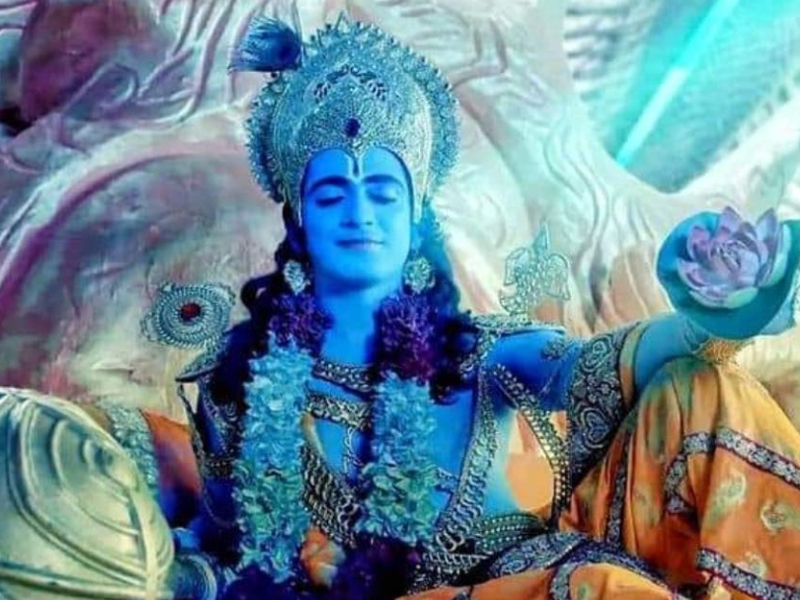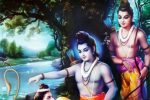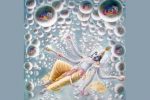NAME 87
Śarma शर्म
Śarman means happiness. When this word is used with reference to the Brahman, it means bliss. Brahman is the embodiment of bliss. He is not just the embodiment of bliss alone; He is the embodiment of everything that prevails in the universe. He is also full of anger, rage, pains and miseries. Otherwise, He cannot be omnipresent.
A jīvanmukta can also be in the state of total bliss. A jīvanmukta is free from fear of death and he is not bound by limitations. He is a liberated person who continues to live merely to wipe out the remains of his karmas. A jīvanmukta always remains in the state of saccidānanda, the eternal bliss.
Gabriel Pradiipaka explains the state of jīvanmukta thus: “The first obvious difference between a Jīvanmukta and an aspirant occurs when the former remains undisturbed while the latter just cannot. But there is another difference. Even when the Jīvanmukta feels sorry for having had that painful experience (like the rest of human beings do usually), sooner or later Turya emerges and triumphs. A Jīvanmukta lives within the body of his Lord, in the middle of His processes of contraction and expansion. So, here you have him feeling sorry for something, and at the next time you see him and he is full of Joy. For that reason, the scriptures say: “Tajjayati” or “That triumphs”. Turya, the state of the Self, always triumphs and overcomes even depression, pain, fear, etc.
So, the Jīvanmukta lives now like a mere mortal and then like an immortal. He cannot help having pleasant and unpleasant experiences, but his reaction is different. Even when he may react like a mere mortal, in the end Turya appears and shatters his pain. In his case, Turya is more powerful than the external circumstances at the mercy of which his physical body is exposed. He cannot stop behaving like a mere mortal, even though he might act like an immortal now and then. But even after showing how human he is, his Turya is so strong that It will come and snatch his pain from him by force.
Therefore, people harboring the idea that a Jīvanmukta is like a kind of super human being, unable to feel sorry or pain or fear in all respects, cannot detect the presence of a real Jīvanmukta because he looks so usual. That false idea about Jīvanmukti or Liberation while one is alive was manifested by the Lord for undeserving people not to come near His devotee.
All in all, Turya can be recovered by a lot of effort in the case of an advanced aspirant, but a Jīvanmukta experiences the emergence of Turya in a pretty autonomous way. It just emerges spontaneously and takes it all! Despite the Jīvanmukta experiences difficulties in his bodily life like the rest of the mortals, Turya always triumphs in his case.”
Sharma – He is the Ultimate Bliss
Bhagavan is the embodiment of pure and unadulterated joy or total bliss, Sharma essentially means this state of supreme joy. Both Parasara Bhattar and Sri Adi Sankara give the same meaning. ‘Paramaananda Roopatvaat Sharma – He is called Sharma because he personifies the state of highest bliss’.
Śrīmad Bhāgavata – Canto 7, Chapter 8
Adyaitaddharinararūpamadbhutaṃ te dr̥ṣtaṃ naḥ śaraṇada sarvalokaśarma,
So’yaṃ te vidhikara īśa vipraśaptastasyedaṃ nidhanamanugrahāya vidmaḥ. (56)
:: श्रीमद्भागवते सप्तमस्कन्धे आष्टमोऽध्यायः ::
अद्यैतद्धरिनररूपमद्भुतं ते दृष्तं नः शरणद सर्वलोकशर्म ।
सोऽयं ते विधिकर ईश विप्रशप्तस्तस्येदं निधनमनुग्रहाय विद्मः ॥ ५६ ॥
The associates of Lord Viṣṇu in Vaikuṇṭha offered this prayer: O Lord, our supreme giver of shelter, today we have seen Your wonderful form as Lord Nṛsiḿhadeva, meant for the good fortune of all the world. O Lord, we can understand that Hiraṇyakaśipu was the same Jaya who engaged in Your service but was cursed by brāhmaṇas and who thus received the body of a demon. We understand that his having now been killed is Your special mercy upon him.
One who is Bliss, the Highest Goal to be attained.
८७. ॐ शर्मणे नमः |
87. OM Śarmaṇe Namaḥ
Sarma -One who is Himself the Infinite Bliss. Transcending the mind lie the shores of Bliss, beyond the waters of agitations. The Infinite is described in our Upanishads as the “Sacchidaananda”, ever of the same nature-“Saantam Sivam Sundaram”.
Paramānaṃdarūpatvād brahma śarmeti kathyate / परमानंदरूपत्वाद् ब्रह्म शर्मेति कथ्यते As He is of the nature of supreme bliss, He is Śarma.
INTERPRETATION GUIDED BY SANT VANI (WORDS OF SAINTS)
Śarma
The one in the form of ānanda.
He, whose name is Śarma (which stands for) the Supreme Brahman which is his very existence. His very nature is that of that supreme bliss(Śaṅkara & Parāsara Battar).
He is Śarma because His very svarūpa is paramānanda, limitless happiness. Nowhere is the enquiry into the nature of happiness as sophisticated and deep as in Vedanta.
Some of us may experience pointlessness in our lives, sometimes. A new day, yet the same routine. People are born and they die and do something in between. And another new day but the same thing..And six months of the year have flown by. What breaks the monotony of the routine or our lukewarm experience of life, is a moment of happiness. It may have come from some slapstick or subtle humour, discovery of new shoots in a plant that you had considered beyond survival, somebody’s welcoming warm smile. In this moment of ananda, we experience ourself as adequate, for a while. There is freedom from being inadequate, despite so many of our anxieties, concerns and unfulfilled desires. This is important to recognise.
When we look into it, happiness did not really lie in the humour, smile or the plant because if that was the case, these should always have the ability to make me happy. What these really did, is to invoke the happiness, ananda that is my nature. This is the unspoken norm for all of us.
Suppose I ask a Finnish friend who has never heard or tasted about the best laddoos (Indian sweet) in India, she will not be able to say much. Since she has not tasted or even seen a foodie recommendation, she has no norm, to say which laddoos are better than the other.
On the other hand, happiness is the norm, against which I measure all my experiences – “I am delighted by what you said,’ I have happy memories of the time spent. Oh that makes me sad..” Whatever be the nature of the happy experience, there is a finality in it, atleast for a few moments. No more seeking. The wanting, inadequate mind is suspended for a few moments. We don’t struggle against happiness. We don’t say, “I have had enough happiness for today, no more.” We wish people ‘Happy Birthday,’ Happy Anniversary’ and so on because we know that there is a possibility of the person being unhappy and everyone without an exception wants to be happy. Happiness is the universal norm.
Whenever we pick up a moment of happiness, the degree of happiness that is experienced is only a leśha, a fraction of the ānanda of Īśvara. Someone could well argue that if one is sad, maybe it is a person‘s true nature, as everything around the person evokes sadness. That is not true. What we struggle against, is not us. It is the nature of the fire to burn. If a burning log of wood is washed over with water, the fire in the wood becomes dormant but could still be ignited. The fire does not become cold at anytime, anywhere in the world. There is a veil that covers the person which contributes to the experience of sadness and that is removed by seeking refuge in the Lord which contributes to the discovery of the ānanda that I am.
That Viṣhṇu who is the Sureśa and Śaraṇaṃ (previous two names in this string) exists as pure consciousness and that consciousness is of the nature of supreme bliss – the Sacchidānanda (सच्चिदानंद) i.e. sat (सत्), chit (चित्) and ānanda (आनन्द) – the pure-essence, consciousness, supreme bliss triune (three-in-one).
As Sri Aurobindo points out in the quote below, the Divine is seen in its multiple manifestations and aspects and is present in each one of us and in all animate and inanimate beings but there exists a Supreme that dwells in a plane of existence that is transcendental and beyond the plane in which normal beings exist and for normal beings to even get a glimpse of that Supreme, the normal realm of existence has to necessarily be transcended.
“The Divine is everywhere on all the planes of consciousness seen by us in different ways and aspects of His being. The Divine can be and is everywhere, masked or half-manifest or beginning to be manifest, in all the planes of consciousness. But there is a Supreme which is above all these planes and ways and aspects and from which they come.” – He is that Śarma
The Śhwetāśhvataropaniṣhad clarifies across verses 1.8, 1.10, and 1.12 the nature of the world, the individual self and the supreme being. This is paraphrased below:
The world that we live in is an admixture of the perishable and imperishable, that which is manifest and those that are unmanifest – all of these are seemingly inseparably bound together – the Supreme being makes no distinction and supports all of these as the great foundation of the entire universe. As long as the individual Ātman is bound together with the material world, it remains disconnected from its source, the Supreme being. The moment the individual Ātman sees the reality, the fetters of the world fall away.
Matter is perishable and therefore its nature is asat. The Supreme is imperishable and unchanging and therefore sat. Meditation on that sat as the only reality leads to the realization of that sat.
The culmination of this meditation on the Supreme being is the disappearance of all differences among the triune – the ‘enjoyer‘ the ‘enjoyed‘ and that which brings about this enjoyment – this is the state of Sacchidānanda (सच्चिदानंद).
That Sacchidānanda’s name is Śarma.
In a conversation with one of his disciples, Swami Vivekananda explains how he experienced this state of absolute oneness and unparalleled bliss – Sacchidānanda:
One day in the Cossipore garden, I had expressed my prayer to Shri Ramakrishna with great earnestness. Then in the evening, at the hour of meditation, I lost the consciousness of the body, and felt that it was absolutely non – existent.
I felt that the sun, moon, space, time, ether, and all had been reduced to a homogeneous mass and then melted far away into the unknown; the body-consciousness had almost vanished, and I had nearly merged in the Supreme. But I had just a trace of the feeling of Ego, so I could again return to the world of relativity from the Samadhi.
In this state of Samadhi all the difference between “I” and the “Brahman” (God, the Absolute Divine Consciousness) goes away, everything is reduced into unity, like the waters of the Infinite Ocean — water everywhere, nothing else exists — language and thought, all fail there. Then only is the state “beyond mind and speech” realized in its actuality. Otherwise, so long as the religious aspirant thinks or says, “I am the Brahman”–“I” and “the Brahman”, these two entities persist — there is the involved semblance of duality.
After that experience, even after trying repeatedly, I failed to bring back the state of Samadhi. On informing Shri Ramakrishna about it, he said, “If you remain day and night in that state, the work of the Divine Mother will not be accomplished; therefore you won’t be able to induce that state again; when your work is finished, it will come again.
PLEASE READ
https://os.me/the-secret-of-happiness/
“Himalayan lotuses don’t grow in fresh water ponds, they blossom in marshes. Emptiness or unhappiness is not a dysfunction of life. It’s not a malfunction of your mind. It simply means that life is telling you to reflect on yourself and your actions. It’s asking you that you no longer neglect your calling or that you find one. The seed of fragrance is the very basis of your existence. When stagnation arrives, the lotus of transformation is ready to bloom. All you have to do is not oppose it.
Go with the flow and see where life takes you. Let the seed sprout.
He who has a Why to live for can bear almost any How…” – Om Swami
PLEASE READ
https://os.me/nine-stages-of-attaining-bliss/
Samadhi is not about seeing a flash of light or a one-of-fleeting-moment of feeling one with the cosmos. What good is that experience? How will that transform one? Many texts of the modern age lead the reader to believe that you are sitting in a meditational posture and one day you go just in Samadhi, as if by accident. That is a load of rubbish, for, what cannot be validated and replicated, has no place in the eyes of a yogi. In Samadhi, you have full consciousness. Surely, it is so sharp and so channelized that it is different from the normal state of consciousness. – Om Swami



